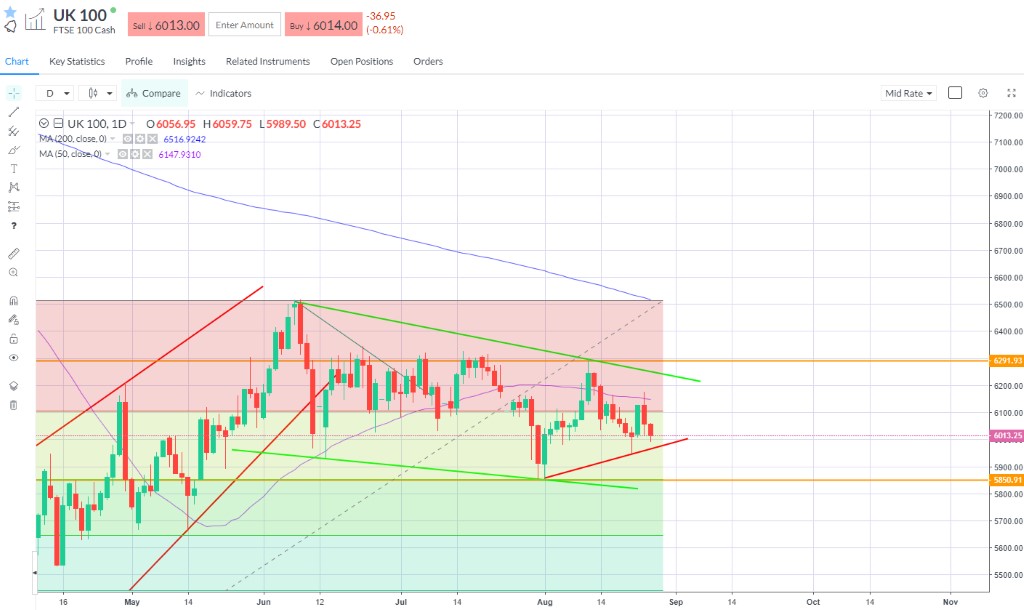
Wednesday Aug 26 2020 08:36

5 min
Stocks in Europe chopped sideways after fresh records were set on Wall Street and traders start to turn their attention to Federal Reserve chair Jerome Powell’s speech tomorrow. Tuesday saw risk appetite go off the boil after a strong start to the European session – the FTSE 100 ended sharply lower while the DAX closed at the session low to end flat on the day.
The timid recovery across European bourses has left the rally in the US looking even more impressive. A pullback in Apple shares did hit the Dow – it won’t have such a big effect come Monday when its weighting will fall with the stock split (the Dow Jones is a price-weighted index). Shares in ExxonMobil, Pfizer and Raytheon all fell as they were given their marching orders from the index, while their replacements – Honeywell, Amgen and Salesforce.com – all rose sharply. The S&P 500 rose 0.36% to a new all-time high.
The FTSE 100 has endured a tough 24 hours – having hit a high yesterday morning near 6,180, this morning the blue-chip index is testing the 6,000 support. Last week’s low at 5,948 is yet to be tested again, however, and bulls will be hopeful that a base is forming and the near-term downtrend off the June highs is ending. If the dollar weakens further and sterling rallies, this support level could go.

Data today is light – US durable goods orders forecast at +4.4% and +1.9% core, which would be a sharp slowdown from last month’s +7.6% (+3.6% core). The weekly EIA crude oil inventories report is also coming later today.
WTI rose on a bigger than expected API draw as well as concerns about Hurricane Laura affecting supply. The American Petroleum Institute (API) reported crude oil inventories fell 4.5 million barrels for the week ending August 21st, after a 4.3m barrel draw the previous week. The forecast for the EIA figures today is for a draw of 3.4m. WTI (Oct) rallied for the best part of yesterday to test the $43.50 resistance where it immediately backed off.
Crude prices continue to grind higher as the economic data continues to indicate a slow recovery.
Andy Haldane, the Bank of England’s chief economist and leading V-shaped recovery proponent, will speak later. His optimistic attitude the economic recovery is at odds with many.
The real focus on the central bank front this week though is the virtual Jackson Hole Symposium and Jay Powell’s speech tomorrow as US cash equity markets open. Expectations are running high: Powell is set to use this to deliver a shift in the way the Fed approaches inflation, sending a dovish message to the market that the central bank is in this for as long as it takes. The lack of fresh fiscal stimulus only makes the Fed likely to be more dovish.
Essentially, we think the Fed will signal explicitly it is prepared to allow inflation to run hot for longer with a new average inflation target. All this means is the Fed will be lower for longer. This should support risk and could weigh on the US dollar, but there is a risk that inflation expectations can start to become unanchored as they did in the 1970s.
If inflation spikes and the Fed lets it by continuing to keep yields down, stocks and gold should be the main beneficiaries. The vast increase in the supply of money combined with major supply chain readjustments and reshoring taking place against the backdrop of US-China trade tensions, suggests a bout of inflation is around the corner when a vaccine arrives and the real recovery takes hold, despite the initial disinflationary effects from the pandemic.
The US dollar has marched lower since its March blowoff. But lately there have been signs of a base forming around the 92-93 level for the dollar index. An aggressively dovish message from Powell this week could see this support tested initially, but we should also bear in mind that average inflation targeting without, for example, yield curve control, could create a much steeper yield curve (i.e. higher long end yields) in tandem with higher inflation expectations, which could support USD in the longer term. US 10 year yields have already start to move higher, rising to 0.7%.
